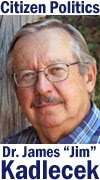“As man draws nearer to the stars, why should he not also draw nearer to his neighbor?” – Lyndon B. Johnson
$4,681 out of your family’s bank account. That’s what the
That same Web site shows you that if we had spent that money on affordable housing, we could have built 1,070,377 more units for families. Or we could have provided health care to 40.5 million people for a year. Or paid for college scholarships for 21.2 million students for a year. So, what are our priorities?
What have we learned from the horrendously wrongheaded
If we “win,” what will that get us? Will we then be safer? How much more will this thing cost us in lives and treasure?
Among other lessons, it seems to me that we ought to have learned several things:
• Despite our massive military might, we cannot “win” wars like the current conflict in
• We cannot impose our version of democracy and freedom on countries that for cultural or religious reasons are not interested.
• We should never again allow political motivations to corrupt our intelligence services.
• Our economy cannot sustain this kind of expensive “adventure.”
• The American people have no stomach for long conflicts in far away places.
• Despite our power and wealth, we can’t afford to do everything all over the world.
It’s time to focus on
I would suggest that the time is right for the adoption of a new, more restrained, more limited set of foreign policy goals. I think our focus should be on
I do not suggest isolationism, but rather an approach that first strengthens and protects our neighbors and ourselves before we allow ourselves to be involved extensively in other parts of the world – a North American Collaboration, perhaps comparable to the European Union in some ways.
Ten years ago, we made a small move in that direction with NAFTA, and we have had a strong security relationship with
Look at everything we already have in common. All three countries are democracies. We already obtain much of our supplies of natural gas, oil and electricity from either
Collectively, we have the natural resources, skills, labor, technological capability and capital to be totally self-sustaining. In addition, there are many cultural, religious and educational connections between the three.
I refer the reader to a report issued several years ago by the Council on Foreign Relations, in association with Canadian and Mexican groups, Creating a North American Community. The report convincingly outlines our shared security and economic interests, and makes a number of recommendations (steps) in achieving an action plan. It will involve creating some new institutions that focus on this priority foreign policy, the adoption of a rational border action plan (one without fences, I would hope), and strategies to deal with the economic issues particularly between
It seems to be to be a good start toward developing the sort of close relationships we need with our neighbors for security and economic reasons.
Giving up the ‘policeman’ role
Does this mean we ignore all the other global problems and issues around the world? Of course not, but it does imply that we disengage ourselves militarily over time from the “policeman” role. It means that we cease to be a supplier of military aid and weaponry to other countries. It means we stay out of the politics of other countries.
We should continue to play a diplomatic role in assisting troubled areas of the world in resolving problems that threaten global security and stability. We should also continue to join other countries of the world in providing humanitarian assistance as needed. We should continue to expand trade relationships that benefit us and our neighbors.
But our primary focus should be on our neighborhood, the North American continent. Our attention and resources should first go to that priority ahead of other concerns and needs around the world. Doing this will protect us and build back our global credibility, and it will help to rebuild our struggling economy. It is a policy that we can afford, and one that makes sense.
Kadlecek has lived in

